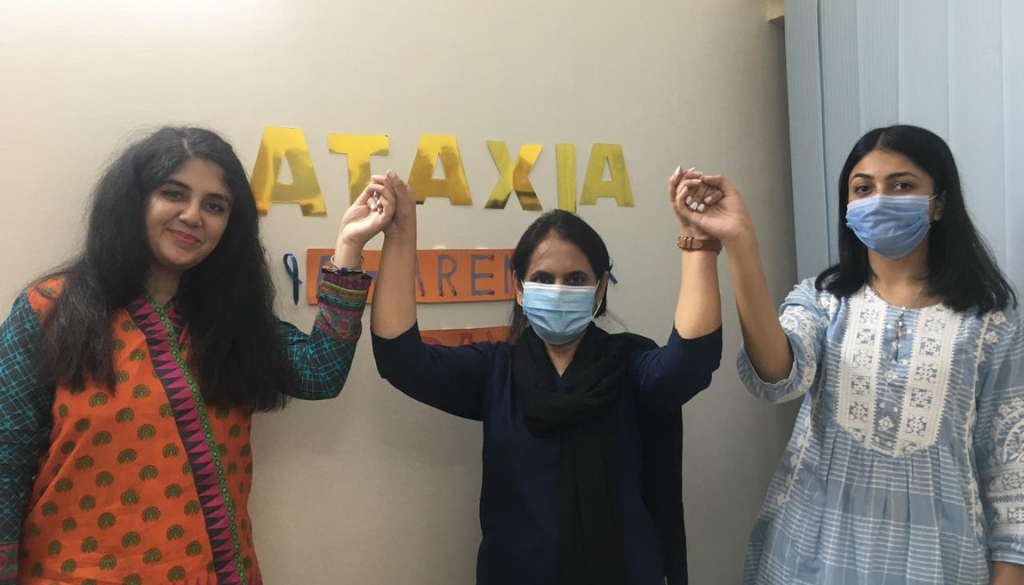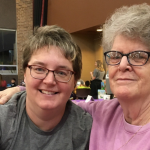Ayesha Abeer – Looking at the Bigger Picture
Ayesha Abeer is a lovely lady from Pakistan who received her diagnosis of SCA type of 7 after two years of testing. She is very active in raising awareness for ataxia in her country through social media and her own blog.

My journey to the diagnosis of SCA type 7 started with weakness of my eyesight. As I matured to the age of eighteen, several eye specialists later we were recommended to a neurologist named Dr. Mazhar Badshah (a differently-abled senior neurologist). After our initial appointment, he sent us (me and my mother) for a series of tests that included MRI, NSG, and so forth which was the evidence that he used to diagnose me with Spinocerebellar Ataxia.
This was all during 2018. Moving on to 2020, I traveled to London, United Kingdom as recommended by our neurologist for the Gene Test which would confirm the type of SCA which would make it easier to manage. Ataxia has more than 54 known types. I had my Gene Test in Doctors Lab and the result came after 2 months by which time we had come back to Islamabad, Pakistan where we live. So it took 2 years of testing and doctors and going 7000 miles to the UK for me to be diagnosed with SCA type 7.
When l was first diagnosed with Ataxia, l used to go to an Early Childhood (EC) Centre where I helped and also taught preschoolers. During my initial diagnosis, my family and I were rather oblivious to the severity of Ataxia and what it will lead to. Although we had read about it and even the doctors had told us about Ataxia, we were still not aware as we hadn’t experienced it yet. During the global pandemic, we were self-quarantined and I had left the EC Centre, during this time my strength weakened and I knew I could not continue with this job although I volunteered there and loved spending my day around the laughter of little kids. Basically, Covid made a lot of things easier for someone like me with progressive ataxia. Being Ataxic means ‘change’ in everything we do and due to the quarantine during the pandemic making the switch to online learning and staying at home longer was easier. Rewinding into 2018 before my gait and vision started getting affected, l used to attend social and educational events where l danced and met literate individuals. Playing on my phone, cooking, talking to strangers, and listening to music were some of my favorite hobbies.
I believe ataxia and the pandemic have made me a foodie. This has shown adverse effects and taken a toll on my physical health as l have become more inactive and lethargic. However, l try to get on my feet whenever l am motivated and try to do chores around the house with our house helper and my sister.
There isn’t much to share but l believe the lesson l learned from Ataxia was to be more helpful, kind, and considerate towards society and the people around me and these are possible even WITH Ataxia. l also learned and got closer to my religion and my God and l saw how people of my religion are more courteous and pray for me and my wellbeing.
When l was diagnosed even me and my family were unaware of what Ataxia is and unfortunately, that is the case throughout major parts of my country Pakistan. My sister and I started an online Instagram page for Ataxia awareness in Pakistan so people could be made aware of Ataxics and the things that come along with it. One year in, I have my own blog and even a Facebook page. I even had an unforgettable international Ataxia awareness day celebration with my family and physiotherapist to celebrate the inauguration of our journey towards awareness of Ataxia in our country!
One thing id like to say is that religion is hope and hope is important for life. Materialistic things don’t matter, we should always be looking at the bigger picture. This is what I try to live by.

Thank you Ayesha Abeer for sharing your story and spreading awareness for ataxia in Pakistan. Keep up the good work!
Please consider sharing your story – whether you have Ataxia, are a caregiver, friend, or relative. You may fill out the form below to get started.




